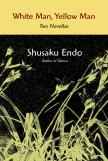God Hides
It takes courage to read one’s life in psychological, social and spiritual terms. Oftentimes the venture requires metaphor, and metaphor is the substance of art. Style gives form to content, and creative content acts as a catalyst for understanding.
The stories of the Japanese Catholic writer Shusaku Endo are filled with the content of his life. He wrote: “I have forged intimate familial ties with these characters, who are reflections of a portion of myself.”
During the first 10 years of his life, Endo lived in Manchuria. When his parents divorced, his mother returned to her native city of Kobe, converted to Roman Catholicism and baptized her young son. Both events marked the young boy as an outsider.
Japanese nationalism during the Second World War and a Catholic morality that smoldered with pre-Vatican II austerity added ambivalence to Endo’s Western faith in an Eastern culture. Nevertheless, Christianity and Catholicism become predominant themes in the author’s writings.
Illness and hospitalization would be constants in Endo’s life, as well as frequent themes in his writing. He spent the war years as a worker in a munitions factory. During that time he began writing for literary journals, and in 1950 he traveled to the University of Lyon to study French Catholic authors.
In 1955, soon after completing his studies in France, Endo was awarded a prize for his short novel White Man. Soon after, a second novella appeared with the title Yellow Man. Both works are a tangle of moral and spiritual dilemmas. Both include diaries. In both stories we feel the heavy weight of evil counteracted precariously by gratuitous redemption. Readers familiar with Graham Greene and Flannery O’Connor will find in Shusaku Endo a kindred spirit.
White Man is set in occupied Lyon in the year 1942. The nameless narrator, a young Frenchman collaborating with the Nazis, writes to make a record of his actions. “I must live,” he writes at the beginning of the diary, “history can never annihilate me.” Like a character in a medieval morality play, evil takes on a physical form.
But even at the darkest moments of betrayal and cruelty, the narrator cannot escape the possibility of redemption. After achieving his initial goal of deceit, he comments, “Something like desolation tugged at my heart.” He admits experiencing “rage and shame” before the Catholic seminarian whose principles he detests. He is unnerved by the image of Christ in the church where he goes to spy on his adversaries: “It was as if he meant to seduce me, preying on my most vulnerable points.” When the seminarian is arrested and tortured by the Gestapo for his part in the French Resistance, the narrator is an accomplice but holds the torturers in contempt and surprises himself by praying for the seminarian’s endurance. While the narrator’s overall intent is to prove that “evil is eternal” and to unmask the artifices of those “intoxicated with belief” and martyrdom, the end result is a “profound fatigue” and “a storm over a gray sea of sorrow.”
Yellow Man is told through a letter written to a French missionary in a Japanese prison camp during the Second World War. Chiba-san, a Japanese student, writes to his former mentor in the Catholic faith, Father Breau, and includes the diary of the recently deceased Pierre Durand. Mr. Durand was also a French missionary until a liaison with a Japanese woman resulted in his expulsion from the church.
The student writes of his abandonment of a white, foreign God. He prefers a pagan tranquility in place of Catholicism’s internal battles with sin and death. Mr. Durand, on the other hand, can never escape the God from whom he expects eternal damnation. Fear prompts him to betray Father Breau, his only friend and source of solace. Meanwhile, the student, with incipient signs of tuberculosis, opts for indifference as he betrays the fiancée of his childhood friend and leaves unspoken a word of warning to his former mentor.
When the confessional diary is entrusted to the Japanese student, the broken man, Durand, walks off to certain death “a few seconds before the bombs fell.”
These are hard stories from which to extract a glimmer of redemption, but as Shusaku Endo once wrote, “Christ did not die for the good and beautiful.”
This article also appeared in print, under the headline “God Hides,” in the April 27, 2015, issue.








